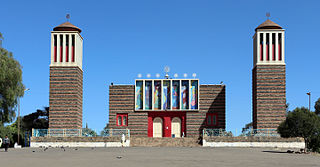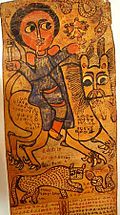Related Research Articles

Frumentius was a Phoenician Christian missionary and the first bishop of Axum who brought Christianity to the Kingdom of Aksum. He is sometimes known by other names, such as Abuna and Aba Salama.

Isaias Afwerki is an Eritrean politician and partisan who has been the first and only president of Eritrea since 1993. In addition to being president, Isaias has been the chairman of Eritrea's sole legal political party, the People's Front for Democracy and Justice (PFDJ).

Saint Yared was an Aksumite composer in the 6th century. Often credited with being the forerunner of traditional music of Ethiopia, he developed the music of the Ethiopian Orthodox Church and Eritrean Orthodox Church. In a broader context, he helped establish liturgical music in the Coptic Orthodox Church and Syriac Orthodox Church, as well as create the Ethiopian musical notation system. Additionally, he composed Zema, or the chant tradition of Ethiopia, particularly the chants of the Ethiopian-Eritrean Orthodox Tewahedo Churches, which are still performed today.

The Church of Our Lady, Mary of Zion is an Ethiopian Orthodox Tewahedo Church which is claimed to contain the Ark of the Covenant.

Meskel is an Ethiopian and Eritrean Orthodox Tewahedo Church holiday that commemorates the discovery of the True Cross by the Roman Empress Saint Helena of Constantinople in the fourth century. Meskel is celebrated by Oriental Orthodox members of the Ethiopian Orthodox Tewahedo Church, the Eritrean Orthodox Tewahedo Church, and to a lesser extent Roman Catholic members of the Ethiopian Catholic Church, the Eritrean Catholic Church, and among Protestant members of P'ent'ay - Ethiopian-Eritrean Evangelicalism. It is a localized version of the Feast of the Cross and occurs on the 17 Meskerem in the Ethiopian calendar. "Meskel" is Amharic for "cross".

Enkutatash is a public holiday in coincidence of New Year in Ethiopia and Eritrea. It occurs on Meskerem 1 on the Ethiopian calendar, which is 11 September according to the Gregorian calendar.
Ewostatewos was an Ethiopian religious leader of the Orthodox Tewahedo during the early period of the Solomonic dynasty of Ethiopian Empire. He was a forceful advocate for the observation of the Sabbath in Christianity. His followers, known as the House of Ewostatewos, have been a historic force in Tewahedo Orthodoxy.

Human rights in Eritrea are viewed, as of the 2020s, by non-governmental organisations (NGOs) such as Human Rights Watch as among the worst in the world, particularly with regards to freedom of the press. Eritrea is a one-party state in which national legislative elections have been repeatedly postponed, the judiciary is weak, and constitutional provisions protecting individual freedom have yet to be fully implemented. Some Western countries, particularly the United States, accuse the government of Eritrea of arbitrary arrest and detentions and of detaining an unknown number of people without charge for their political activism. Additionally, Eritrean citizens, both men and women, are forcibly conscripted into the military with an indefinite length of service and used as forced labour.

Abuna Aregawi was a sixth-century Syrian monk and canonized by the Ethiopian Orthodox Tewahedo Church, as well as by the Ethiopian Catholic Church, as well as the Eritrean Orthodox Church. He is one of the Nine Saints, who came from the Roman Empire to Ethiopia, and are credited for founding many monasteries and churches and was the main force behind installing monasticism in Ethiopia.
Abba Samuel, or commonly called Samuel of Dabra Wagag, was an Ethiopian saint living in the latter half of the 14th and the first decades of the 15th century. The source for his life is his hagiography, most accessible in Stanislas Kur's French translation of the Ge'ez original, Actes de Samuel de Dabra Wagag. The original work survives only in two 20th century manuscripts, both copies of a 16th-century revision of an earlier composition. He founded the monastery Debra Wagag.

Debre Bizen is an Eritrean Orthodox Tewahedo Church monastery. Located at the top of Debre Bizen the mountain near the town of Nefasit in Eritrea. Its library contains many important Ge'ez manuscripts.
Debre Mariam is a monastery in Qohayn Eritrea, founded by Abba Absadi, a disciple of the monk Ewostatewos between 1340-1350. The monastery is located at the confluence of the Obel and Gash Rivers. Since its founding the monastery acquired an extravagant manuscript library. Debre Mariam was the preeminent monastery in Eritrea until Debre Bizen surpassed it.

Eritrea as a country and the Eritrean community are multi-religious. Eritrea has two dominant religions, Christianity and Islam.
Abib and Apollo were two Christian ascetics from Akhmim, Egypt. They are mentioned in the Synaxarion, das ist der Heiligen-Kalendar der Koptischen Christen. Their feast day is celebrated on November 4.
Abba Hor, Besoy, and Daydara were Christian martyrs in Egypt in the fourth century.

Ethiopian Greeks, or Greeks in Ethiopia, are ethnic Greeks from Ethiopia. Today they number about 500 persons and can be traced back to ancient times. They are mainly located in the capital, Addis Ababa, and the city of Dire Dawa.

Meskerem Assefa Legesse Wondimagegn is an Ethiopian middle- and long-distance runner. She represented Ethiopia at the 2008 and 2012 London Olympics. She has personal bests including 4:02.12 minutes for the 1500 metres, 8:46.37 minutes for the 3000 metres and 2:25:11 hours for the marathon.

The Eritrean Orthodox Tewahedo Church is one of the Oriental Orthodox Churches with its headquarters in Asmara, Eritrea. It was given autocephaly by Pope Shenouda III of Alexandria, Pope of the Coptic Orthodox Church, after Eritrea gained its independence from Ethiopia in 1993. Thus, the Eritrean Church accords a primacy of honor to the Coptic Church.
Ethiopian literature dates from Ancient Ethiopian literature up until modern Ethiopian literature. Ancient Ethiopian literature starts with Axumite texts written in the Geʽez language using the Geʽez script, indigenous to both Ethiopia and Eritrea.

Giyorgis of Segla, also known as Giyorgis of Gasicha or Abba Giyorgis, was an Ethiopian Oriental Orthodox monk, saint, and author of religious books.
References
- ↑ the book of the saints of the Ethiopian church, Vol 3. CUP Archive. 1976. p. 418.
